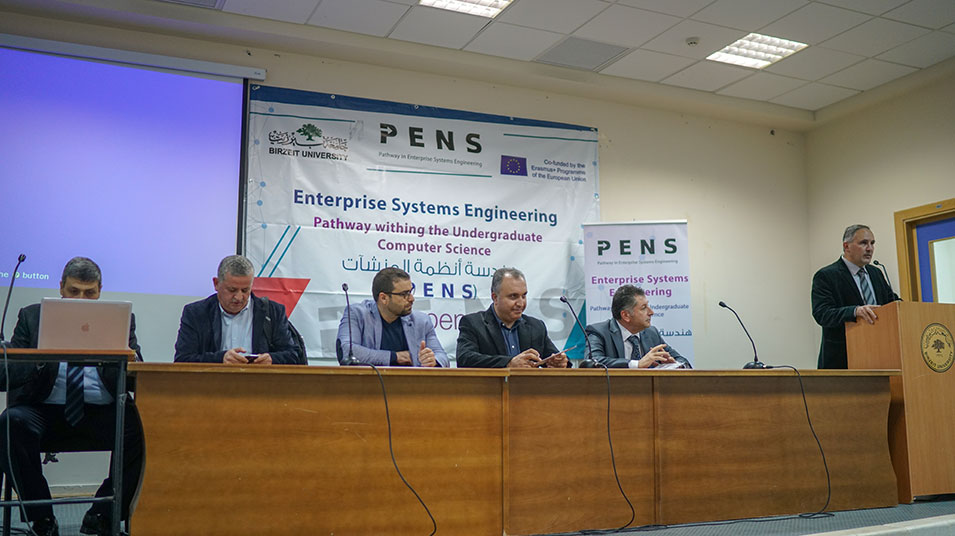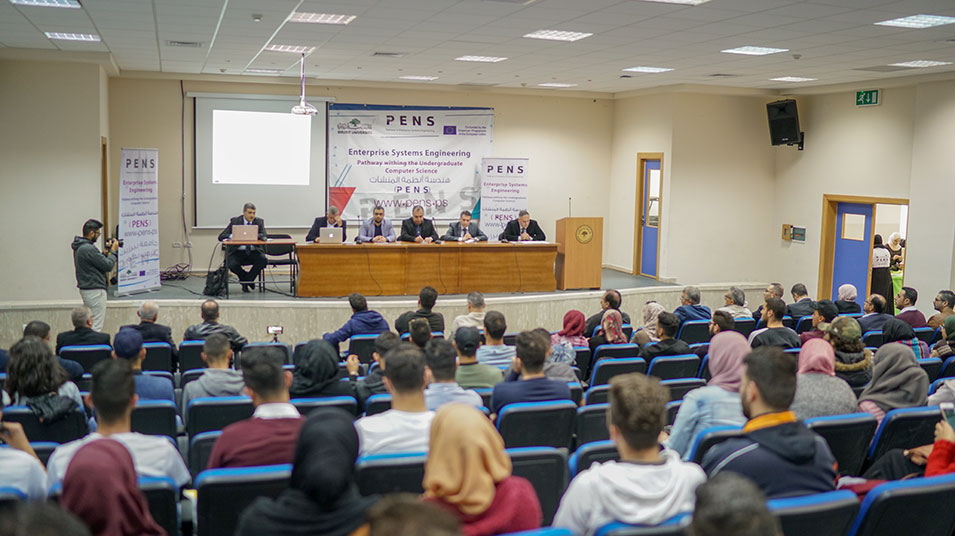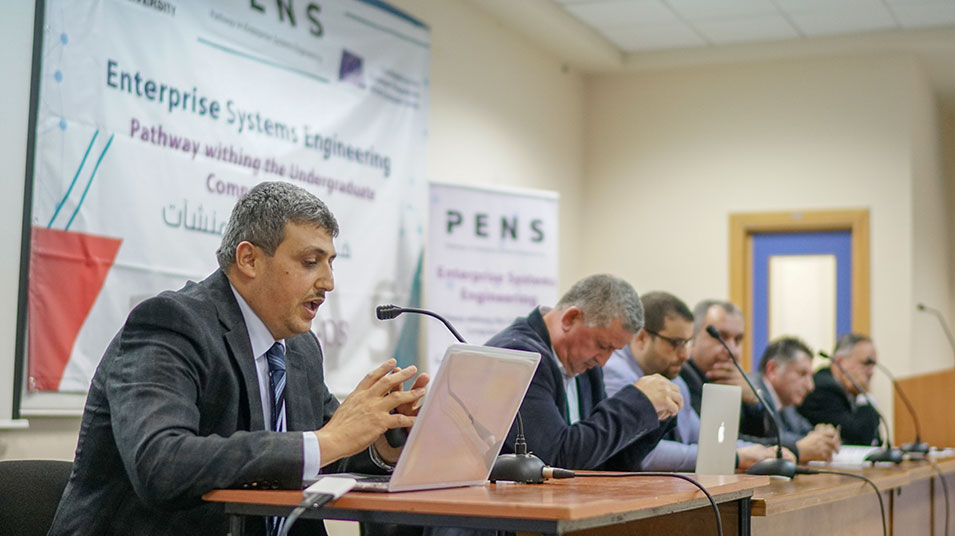Computer science department holds discussion workshop on enterprise systems engineering programs, courses at Birzeit
The Department of Computer Science in the Faculty of Engineering and Technology at Birzeit University held a workshop to discuss the best approaches to developing an enterprise systems engineering minor, on Tuesday, November 13, 2018.
The workshop is part of the Pathway in Enterprise Systems Engineering Project, an Erasmus+- funded initiative to develop enterprise systems engineering courses and programs in Palestine and Tunisia.
The initiative includes the following Palestinian and international universities: Birzeit University, Al-Quds University, the University of Alcala, the University of Cagliari, Middlesex University, the University of Monastir, and the University of Sousse. The project also includes two private-sector partners: the Palestinian Al-Andalus Software Development, and the Tunisian Proxym IT.
Samer Zein, chair of the Department of Computer Science at Birzeit University, said the university prides itself on meeting the needs of the Palestinian job market and the broader Palestinian community.
“At the Department of Computer Science, we are always developing our programs and courses to keep abreast of international developments in computer science and to meet the needs of the local job market with skilled, knowledgeable graduates,” commented Zein.
In addition to the minors and programs offered by the department, added Zein, it has recently launched two new concentrations: Serious Gaming and Health Informatics. The new enterprise systems engineering minor, he noted, would add to the already impressive list of initiatives offered by the Department of Computer Science.
Yousef Hassouneh, director of the Master’s Program In Software Engineering and the Pathway in Enterprise Systems Engineering Project coordinator at Birzeit University, gave the attendees a brief overview of the project.
The program aims to establish a new minor in enterprise systems engineering, Hassouneh said, and aligns with the goals of the Department of Computer Science - and Birzeit University as a whole - to develop programs, courses, and initiatives that keep students and professors abreast of the most recent developments.
“Enterprise systems engineering is not a new idea. With the recent technological advances, however, it is being studied, viewed, and implemented in new ways and perspectives,” Hassouneh remarked, adding that enterprise systems engineering is based around the concept of a system of systems - to view multiple independent systems as part of a larger system.
Rashid Jayousi, a professor of computer science and the Pathway in Enterprise Systems Engineering Project manager at Al-Quds University, commented that he was proud of the partnership with Birzeit University in programs and initiatives such as Serious Gaming and Health Informatics.
Jayousi discussed the importance and significance of enterprise systems engineering and improving cross-enterprise effectiveness, as enterprise systems engineering, he noted, is a holistic area of study.
“Enterprise systems engineering handles a number of systems together, and how they impact each other. This, of course, means that the level of complexity is higher and that the number of variables that affect the system is larger,” said Jayousi, who added that systems engineering focuses more on functionality and performance, while enterprise systems engineering focuses on the whole operational process of the array of systems as a whole.
Mohammad Hamarsheh, chief technical officer and co-founder of Al-Andalus Software Development, introduced the attendees to his company’s work in enterprise systems engineering and how the Palestinian private sector views that area of study.
“It is important to understand that enterprise systems engineering includes application of knowledge; that is, it is practical as opposed to theoretical,” said Hamarsheh. “In academia, the focus is more theoretical. In the industry, however, the focus is on more practical aspects of engineering and computer science. As such, we’re trying to bridge the gap between the two in this project.”
Hani Amer, the IT director at the Palestine Monetary Authority and a 20-year veteran of the communications industry, discussed the applications of enterprise systems engineering in governmental and financial institutions, noting that the interconnected nature of the modern world - combined with the massive amounts of data dealt with by institutions - makes enterprise systems engineering a must for any organization.
“In the 1990s, most enterprises developed their software in-house. Now, however, almost all development is outsourced to IT- and cloud-solutions companies,” said Amer. “However, if an enterprise does not have a clear-cut plan for how the turnkey solutions would integrate with their systems, it would cause more harm than good, and this is where enterprise systems engineering helps.”
Samah Abu Assab, a professor of business administration at Birzeit University, commented that a minor in enterprise systems engineering would not only benefit engineering and computer science majors, but also business administration students and majors of other disciplines, as there is a great need in the market for such areas of study.
“If you look at the market right now, there is a growing trend of including technologies such as artificial intelligence, virtual reality, blockchain, big data, and data analysis as main constituents of a startup,” Abu Assab told the audience members. “All enterprises need these digitalized solutions in today’s market; in fact, the whole world is trending toward utilizing data analysis to gain a competitive advantage.
After the speeches, the attending students, faculty members, and private-sector representatives explored the best methods of developing enterprise engineering programs, courses, and minors that would meet the needs of local and international markets while also pushing the boundaries of what can be done with the current level of technological advancements.











